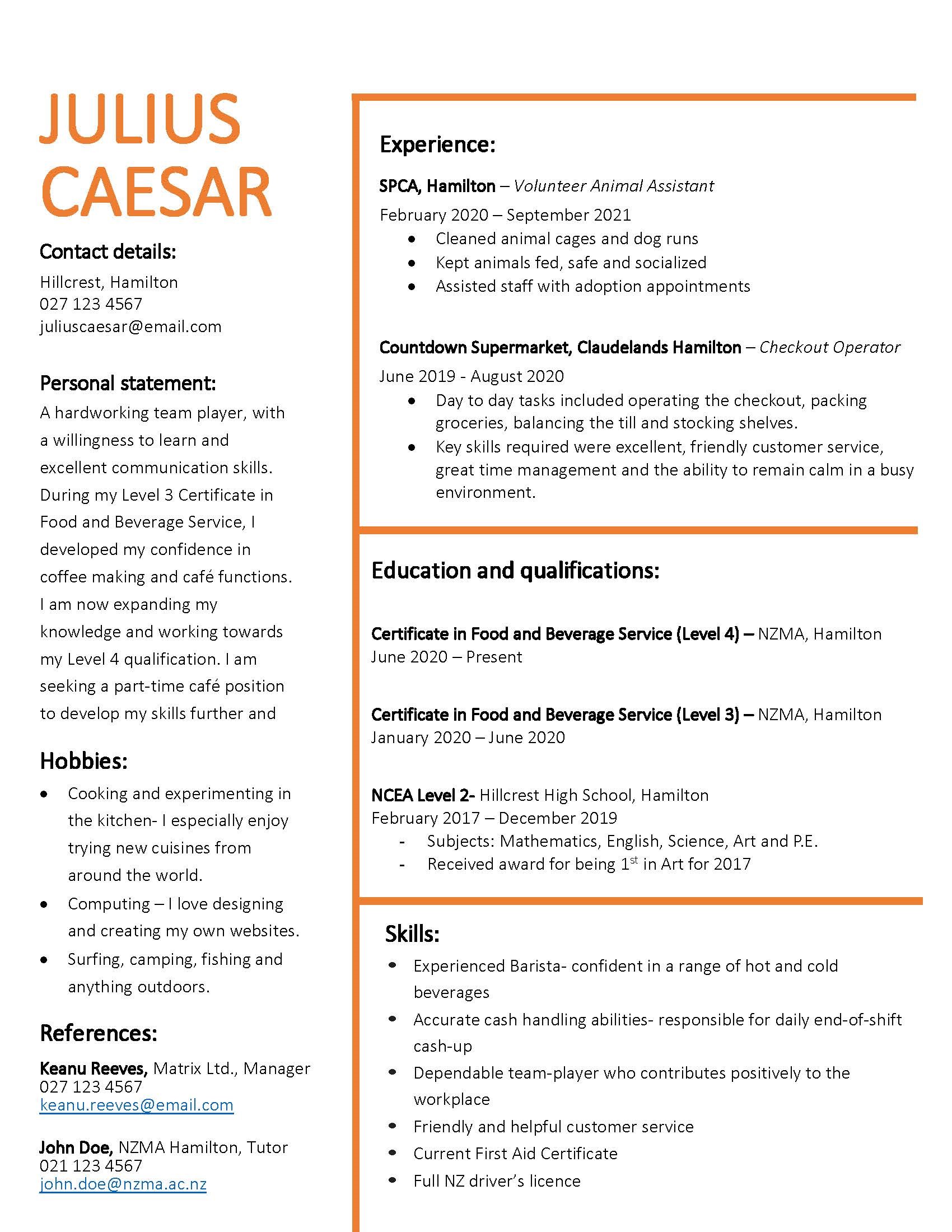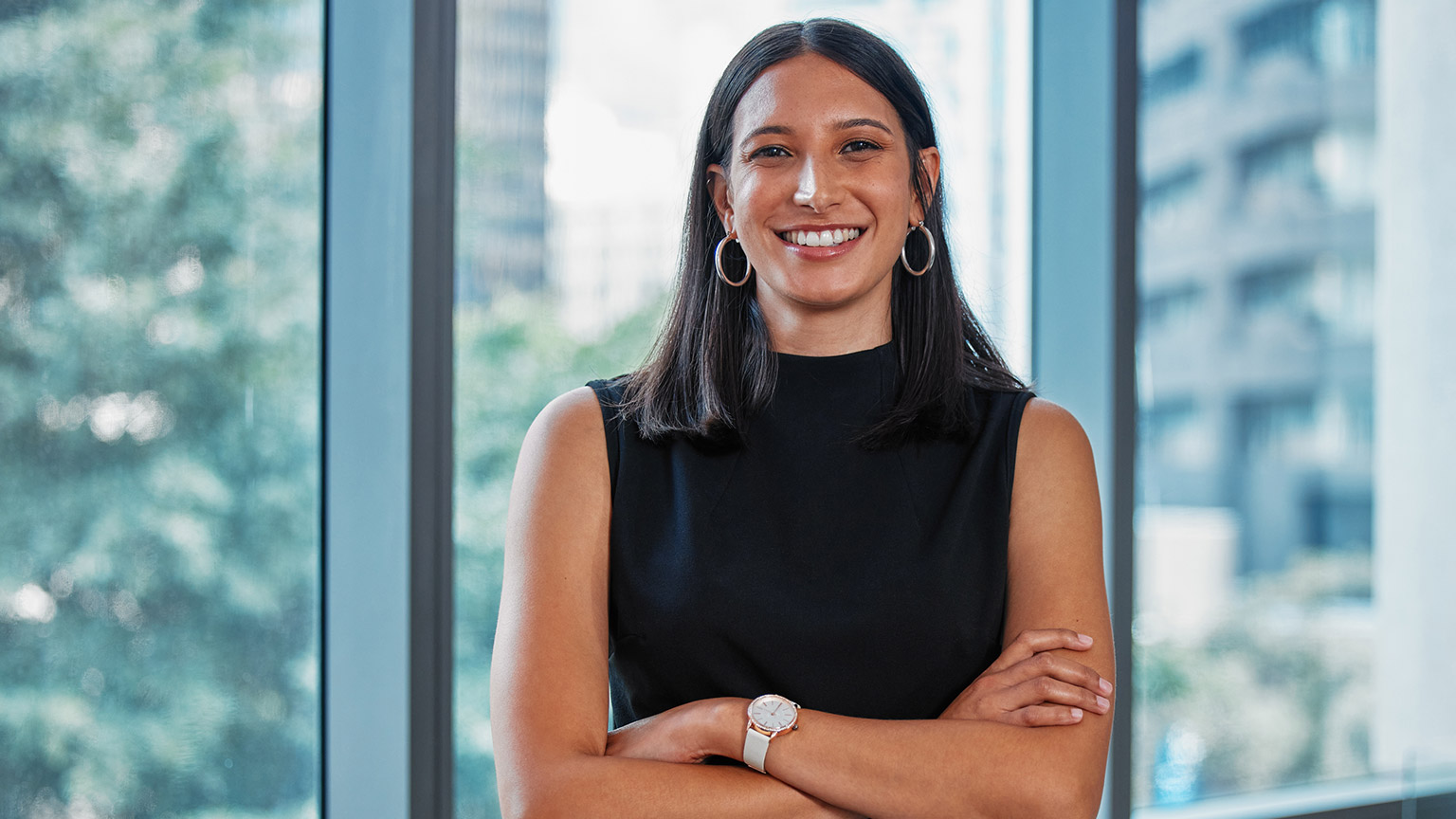Our Career and Employment Navigators team is dedicated to helping current students and recent graduates achieve their career aspirations and find meaningful employment opportunities.
Whether you need help crafting a strong Curriculum Vitae (CV), preparing for a job interview, or simply figuring out your next steps, we're here to help. With our strong industry connections and wide range of resources, we're committed to helping you land your dream job.
We can support you with:
- One-on-one sessions (phone or video)
- CV building workshops
- Job-hunting advice
- Interview tips and preparation
- Editable templates for CVs and Cover letters
- Access to employment opportunities
Contact us
Please email our dedicated Career and Employment Navigators for our Online Campus.
They can be reached at careers@nzma.ac.nz.

I've got some great news for you. Learning how to create a fantastic CV doesn't have to be a tedious task. We're going to make it quick and straightforward using templates, examples, and some simple activities.
You will be provided with a Professional Toolkit that includes an example CV that you can refer to anytime. You will also walk away with templates you can use along with examples of how they can be completed.
Alternatively, there are endless CV templates available online or on Microsoft Word that you can also refer to that will help you build your own CV.
By the end of this topic, you'll have a shiny new CV that showcases your skills and experiences.
By the end of the session, you will be able to:
- Understand what information needs to be in your CV.
- Identify your own skills and personal qualities.
- Write a simple Personal Statement
- Create your own general CV, which you can continue to adapt and develop
Ready to dive in? Let's get started!
Introduction
Are you ready to learn how to write a CV that will impress potential employers? Let's learn how to create a general CV that highlights your strengths, skills, and experiences.
As an NZMA student, you're already working hard to become skilled, knowledgeable, and confident in your area of study. Soon, you'll be ready to put those skills to use in the workforce. Having a great CV will help showcases your hard work and dedication, and set you apart from the competition. Let's get started!
A great CV is the key to getting your foot in the door! Watch the following video that explains how to write up a CV
What is a CV?
‘CV’ stands for ‘Curriculum Vitae. It is a written overview of a person's experience, skills and qualifications, with the purpose of gaining employment or other opportunities.
A good CV will:
- Tell the reader a little about yourself, your skills, education, and experience,
- Show employers what will make you a good worker,
- Match your skills and qualities to the job you’re applying for,
- Help you get an interview, the next step in the recruitment process
Your first-ever CV might be quite simple. That’s ok! Your CV can be considered as a ‘living document’- this means that it will change and grow as you gain more qualifications, skills, and experience. Make sure to always keep your CV up to date with the new qualifications, skills, experiences and other achievements that you gain over time.
Parts of a CV
There are many ways a CV can look, but generally, they will include the following seven categories.
- Personal details and contact information
- Your Personal Statement
- Skills
- Education and qualifications
- Experience
- Hobbies(optional)
- References
Ideally, your CV will be one-two (1-2) pages long, concise, and easy to read.
Pre-made templates are a great option when creating your CV, as all the formatting has been done. All you need to do is add your relevant information.
Let's now look at each section of a CV in depth!
Personal details
This is the first section of your CV. Place this information at the top of your CV. It should be the first thing the employer sees. Make sure to include:
- Name: (first and last)
- Address: suburb/city is fine (eg: Manukau, Auckland)
- Phone number: (mobile and/or home)
- Email address: (make sure the address name is appropriate and professional)
Over time, some of these details may change. So be sure to proofread and ensure this information is updated.
Personal statement
Below your personal details, you will typically find the "Personal Statement". This brief paragraph summarises who you are, your experience, skills, and why you are right for the job.
It’s much easier to write your personal statement after you have written the rest of your CV. This will allow your brain to reflect on your experience, skills, and passions.
The personal statement is a short statement (two- three (2-3) sentences) describing who you are by briefly detailing your key skills, qualities and experience relevant to the role you are applying for. Placed at the top of your CV, your personal summary is your chance to grab the reader’s attention and pitch yourself to potential employers.
Put simply, your statement should summarise:
- who you are
- what you’ve done
- where you’re heading
Examples
Personal statements
- “I am an empathetic and dependable Health and Wellbeing student, currently pursuing my Level 4 qualification at NZMA. My passion lies in helping others and I particularly enjoy working within a fast-paced environment. Working within the Healthcare industry is my dream. To achieve this goal, I am currently seeking a part-time role in caregiving to balance with my ongoing studies and put my skills into practice.”
- “A hardworking team player, with a willingness to learn and excellent communication skills. During my Level 3 Certificate in Food and Beverage Service, I developed my confidence in coffee making and café functions. I am now expanding my knowledge and working towards my Level 4 qualification. I am seeking a part-time café position to develop my skills further and support my studies.”
“A hardworking team player, with a willingness to learn and excellent communication skills. During my Level 3 Certificate in Food and Beverage Service, I developed my confidence in coffee making and café functions. I am now expanding my knowledge and working towards my Level 4 qualification. I am seeking a part-time café position to develop my skills further and support my studies.”
Skills
There are many different types of skills, but generally, they fall into one of two (2) categories:
- Soft skills: Personal skills that you take with you while studying and working, such as problem-solving skills, leadership, and interpersonal skills
- Hard skills: Also referred to as ‘Technical skills’. These tend to be more hands-on and are often particular to a job such as Health, Cookery, Plumbing, or Construction
Soft skills
These are skills that relate to the way you work. These can include interpersonal skills, which influence how you work with others, your approach to problem-solving and how you conduct yourself in the workplace.
Below are some examples of soft skills which are desirable in a range of jobs and industries. Look through these descriptive words and think about which soft skills you possess.
The following are examples of soft skills that are categorised into three (3) different groups. Personal Attributes, work habits and interpersonal skills.
| Personal Attributes | Work Habits | Interpersonal Skills |
|---|---|---|
|
|
|
Hard skills
Hard skills are the technical skills you may need to complete specific tasks required in a job.
These skills are often industry dependent (e.g., coffee making is a required skill for a barista working in a cafe). However, they can also be generic (e.g., Microsoft Office competency could translate into a range of different jobs).
Hard skills are typically learned, meaning that you will likely have a range of new skills to add to your CV near the end of your studies. Highlight your skills on your CV, be proud of your abilities and show your employers what you can do.
Examples
Skills
- Experienced Barista- confident in a range of hot and cold beverages
- Accurate cash handling abilities- responsible for daily end-of-shift cash-up
- Dependable team-player who contributes positively to the workplace
- Friendly and helpful customer service
- Current First Aid Certificate
- Full NZ driver’s licence
Education and qualifications
This section of your CV outlines all your relevant qualifications, training, certificates, and achievements.
These should be in order from most recent to least recent. Having it ordered this way will make sure that the person reading your CV is seeing your most relevant and current qualifications first.
If you have recently left school, include your secondary school and the highest level of study achieved.
You can also use the Education and Qualification section to include any awards or achievements that you have gained during your previous education. This could include things like 100% attendance, acting as a student representative etc., or other academic awards.
Examples
How the Education section could look in your CV:
-
Certificate in Food and Beverage Service (Level 4) – NZMA, Hamilton
June 2020 – December 2020 -
Certificate in Food and Beverage Service (Level 3) – NZMA, Hamilton
January 2020 – June 2020 -
NCEA (Level 2)- Hillcrest High School, Hamilton
February 2017 – December 2019-
Subjects: Mathematics, English, Science, Art and P.E.
-
Received award for being 1st in Art for 2017
-
Experience
The experience section shows your potential employer any work history that you have. Don’t worry if you have never worked before- you can also include things like unpaid work experience, internships, volunteering, or jobs completed in your community (this could include things like babysitting, working on Marae etc).
What to include in the Experience section:
- Current or most recent at the top (Reverse chronological order)
- Organization's Name & Location
- Job title
- Time frame worked from start to end MM/YYYY - MM/YYYY
- Duties and responsibilities (briefly describe in a sentence or with bullet points)
Examples
Experiences
Volunteer- SPCA, Hamilton
February 2021 - September 2021
- Cleaned animal cages and dog runs
- Kept animals fed, safe and socialised
- Assisted staff with adoption appointments
Checkout Operator-Countdown Claudelands, Hamilton
June 2019 - August 2020
- Day-to-day tasks included operating the checkout, packing groceries, balancing the till and stocking shelves
- Key skills required were excellent, friendly customer service, great time management and the ability to remain calm in a busy environment
If you have had a lot of jobs, you don’t need to provide a lot of detail for the older jobs- focus on your recent, relevant roles instead of risking making your CV too long.
Interests and hobbies
The hobbies section is optional- not every CV will need this. However, it can ‘bulk out’ your CV if you don’t have much experience. Only include hobbies that are current and which will assist you in your future employment by painting a positive picture of you as a person.
These could include teams or clubs you are a member of, creative hobbies, sports, or cultural activities.
Ask yourself the following...
"Is this going to help me get the job?”
… if not, then don’t add it.
References
Employers usually ask you to give them at least two (2) referees. These are people they can call to check your experience and find out whether you will fit into their organisation. Choose credible and professional referees who can talk about how you work and are easy to contact. Contact them to request if they are happy to be your reference first. Ideally, this person would be a former employer, but could also be a tutor, coach, teacher, etc.
Provide the following information for your reference:
- Their full name
- The company they work for
- Their position title
- Their contact phone number
- Their Email (optional)
Examples
References
Keanu Reeves
Former Manager- Matrix Ltd.
027 123 4567
keanu.reeves@email.com
John Doe
Hospitality Tutor- NZMA Hamilton
021 123 4567
john.doe@nzma.ac.nz
Alternatively, you can write “References available on Request” on your CV, but make sure that you have your referee details ready in case you are asked for them. Usually this happens after the interview stage.
Final touches
Check your formatting- does your CV look tidy and easy to read? You may need to make some adjustments.
Swap your CV with a friend for feedback and a proofread.
Save your CV in two digital formats- Word and PDF.
Employers may ask for either of these formats. Make sure you have the digital copies saved somewhere convenient to access your CV easily and update them when appropriate.
Remember, add these to your CV as you gain more skills, qualifications, experience, etc. Don't forget that your CV is a living document- so keep it alive! 
Now, we will take the first step to perfecting your interview game. Whether you're a seasoned professional or just starting your career journey, honing your interviewing skills is an essential skill that can make all the difference in landing your dream job.
Here's what we'll be covering to help put your best foot forward during an interview:
- Basic tips on how to prepare for an interview
- Common interview questions (and tips on how to answer them)
- Making a good first impression
- Following up after an interview
- Practicing a mock-interview and receiving feedback
Introduction
If you have secured a job interview- well done! This is a good sign that the employer already thinks you could fit the role well.
There are different types of interviews, including face-to-face, phone, and video interviews. Typically, employers will conduct interviews in person. Depending on the industry and role, job interviews can range from a casual chat to a more formal and lengthy process.
Preparing for an interview

Preparing for an interview can be nerve-wracking, but with some preparation, you can increase your chances of success. Here are some tips to help you prepare for an interview before, during, and after the interview.
Before the interview
Remember that feeling nervous before a job interview is normal, especially if you’re new to job-hunting. Nervousness shows that you care about the job and want to make a good impression. Luckily, there are things you can do beforehand which will help you feel more prepared:
Find out more about the job and organisation
- Carefully read over the job advertisement/description. Note some key details about the job. For instance, what skills, strengths and experience are they looking for?
- Research the organisation to find out more about what they do. Have a look at their website/social media. What appeals to you about this company?
This information will help you answer questions in your interview.
Know your skills and strengths
- Review your CV/cover letter and familiarise yourself with your skills
- Think about how your skills and experience match the role requirements
- Note down examples of times you have demonstrated your skills and strengths. You can use examples from previous jobs, studies, volunteering or even some hobbies (such as sports or groups)
Plan practical details
- Plan your transport to the interview, ensuring that you’ll have enough time to arrive 5-10 minutes early
- Choose your interview outfit- something tidy, clean, and ironed.
- Write down two-three (2-3) questions that you would like to ask the employer.
What should I wear?
Your interview outfit should make a good first impression and help you feel confident on the day. Make sure your clothes are comfortable, clean, and not too distracting. If in doubt, it is better to be overdressed than underdressed.
Ensure that you are well-groomed, and your hair is tidy. Don’t overdo it on the aftershave/perfume and if you’re wearing makeup or jewellery, remember that less is more!
During the interview

Self-introduction
Usually, at the start of a job interview, you’ll be asked to tell the interviewer about yourself. This is a common first question, designed to break the ice and get the interview started. The employer is likely trying to get a sense of who you are, your communication style and an overview of what you’re looking for.
To answer this question, stick to a basic formula of talking about present, past and future.
| Past | Present | Future |
|---|---|---|
|
Talk about previous experience or training. “During high school, I had a weekend job at McDonalds. I progressed through several different roles while there, but my favourite was working in the McCafe. This is why I decided to enrol in a hospitality programme…” |
Talk about your current work and/or studies. “I am currently a student at NZMA Hamilton, where I am completing my Level 3 qualification in Food and Beverage Services. So far, we have learned about….” |
What job are you looking to move into? Why? “I have really enjoyed learning how to make coffees and would like to put my skills to use in a café job. I also enjoy the customer service side of hospitality, which is why your position caught my eye. I noticed that this job is on |
It might help to practice your answer aloud with a friend or family member who can give you constructive feedback.
You don’t need to memorise a word-for-word answer, as that often sounds scripted and unnatural. Rather, focus on the key points you want to get across- the skills, experience and personal qualities that would make you a great fit for this role.
What topics to avoid in a job interview
The following topics should be avoided:
- speaking negatively about your former workplaces, employers or colleagues
- jumping straight into pay-related questions during the interview. These discussions usually happen after an offer has been made by the employer
- using inappropriate language, even if the workplace is relaxed
- unnecessarily talking about personal information and stories.
Stay positive and keep it professional!
What questions employers can't ask
It’s also important to know that there are some questions that are illegal for employers to ask you.
These include questions about your:
- age
- relationship situation
- sexual orientation or gender identity
- religion
- nationality or ethnic origin
- political views
- current or past employers’ work practices
- home life
- health
These questions are illegal because they are unrelated to your ability to do the job and could lead to discrimination. You are not required to answer these questions.
Common interview questions
It’s a good idea to prepare and practice some answers to common interview questions that you could be asked. These often include:
- What’s your biggest strength/weakness?
- What interests you about this job?
- How do you deal with stress?
- How do you handle working to deadlines?
- How would others describe you?
- What work environment do you prefer?
- What skills would you bring to this role?
Employers may also ask for examples from your previous experience, often called ‘Behavioural Questions’.
These questions usually begin with “tell me about a time when…” A helpful framework for answering behavioural questions is the STAR method. STAR stands for Situation, Task, Action, and Result:
Practice makes perfect. Use the following activity to practice how you can respond to interview-style questions. Feel free to download, save and print your responses.
Navigating tricky questions
Sometimes you simply don’t know how to answer a question. Maybe you don’t understand what they are asking, the question is a little tricky, or you can’t put the words together at that moment. Don’t panic! Take a few deep breaths… Here are a few options on how to handle these situations:
- Ask them to clarify or reword the question
- Ask for more time to think about your answer: “hmm that’s a good question, give me a moment to think about that…”
- Request to come back to it later- “to be honest, I’m not sure about that- could we come back to this question at the end?”
You might be asked a question that you don’t have the experience to answer. In these situations, be honest.
For example, if asked:
“tell us about a time that you dealt with conflict in the workplace?”
You could respond by saying:
“Luckily, I haven’t encountered this in my previous work experience. However, if I did encounter this kind of situation, I would approach it by …”
The Importance of Body Language

Humans form opinions within seconds of meeting new people, so first impressions are crucial in a job interview. When communicating with others, it’s not just about the words you’re saying. You also communicate through nonverbal cues such as facial expressions, gestures, body movements and tone of voice. These all make up your ‘body language’, which is said to account for 50% of communication.
Coming across as relaxed, friendly and confident is the goal. Here are some basic tips to monitor your body language:
- When greeting the interviewer, a handshake and eye contact goes a long way
- Sit up straight, still, confidently
- Voice- make sure your voice is loud enough, speak clearly and not too fast
- Eye-contact- if this is something you struggle with, you can try focusing on the space between the interviewer’s eyes instead.
- Nodding- shows you’re listening and understanding what they’re saying
- Smile and don’t be afraid to show some humour (as long as it’s appropriate)
- Remove anything that you might fiddle with or be distracted by- whether this is jewellery, a scarf, a watch, etc. Also make sure to put your phone on silent mode and in your pocket!
After the interview
Immediately afterwards, confirm your interest in the job and ask about the next steps. The interviewer should give you a timeline so you know when you can expect to hear back from them.
Reflect on the interview. Were there any questions that you might need to practice more? What went well? What could you improve on next time?
It’s a good idea to follow up after your interview within 24 hours. Email the interviewer to thank them for their time and express your interest in the job. Eg: “Thank you for your time yesterday. It was great to meet you and hear more about the Front of House position. I really enjoyed seeing the café and I am very excited about the possibility to join your team. I look forward to hearing from you”
If you don’t get the job? It happens! Rejection is never fun, but it genuinely happens to everyone at least once in their lives, and there is no need to see it as a failure. Recognise that this was a great learning opportunity. Every interview gives you valuable experience which will help you in the future.
CV documents and templates
Check out the following documents and templates we have developed to assist you in building your own CV.
CV Examples
The following are examples of how you can complete each template.
- CV example: Julius Caesar
- Cover letter example
- Entry-level CV example
- Skills-focused CV example
- Work-focused CV example
CV Templates
The following includes templates you can use to create your personalised CV.
LinkedIn Student Profile
Download the following file to help you create a professional student profile on LinkedIn.
Interview resources
Looking to start practising how to interview well? We've got you covered! The following are a few resources to help you practice and prepare for an interview.
Prepare and practice interviewing
Visit the following websites for additional information to support you in preparing and practicing for interviews.
Workshops handbook
The following Career Workshop books are documents that reflect the topic you have just learnt. These are for you to download and keep a handful of advice and tips. They can be saved onto your computer or print them out.
